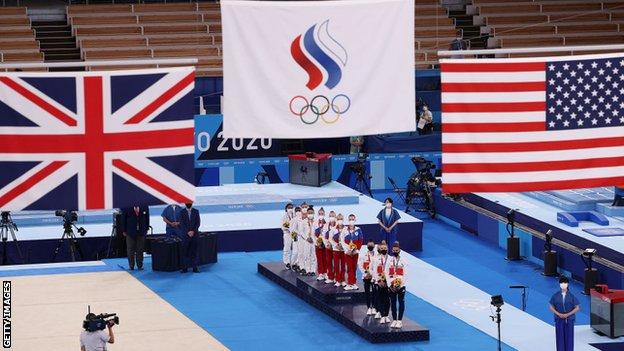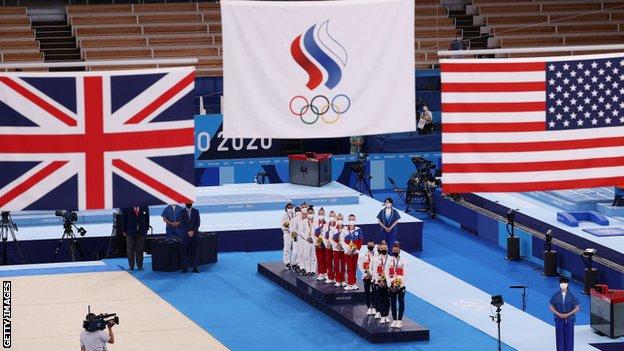Tokyo Olympics: Russians face backlash from fellow competitors
The Russian Olympic Committee are fourth in the medal table at the Tokyo Games but their athletes are facing questions from…


| Dates: 23 July-8 August Time in Tokyo: BST +8 |
| Coverage: Watch live on BBC TV, BBC iPlayer, BBC Red Button and online; Listen on BBC Radio 5 Live, Sports Extra and Sounds; live text and video clips on BBC Sport website and app. |
When Russian athletes stand on the podium after winning an Olympic gold in Tokyo, they hear a Tchaikovsky piano concerto rather than their national anthem.
And some of them also hear questions.
More than 300 athletes across 30 sports are competing as the Russian Olympic Committee rather than as their country as part of sanctions for doping scandals.
They are fourth in the medal table, with 10 golds and 34 medals, but their success has not sat well with some of their fellow competitors who believe they should not be at the Games because of the country’s doping record.
American swimmer Ryan Murphy said Friday’s 200m backstroke final was “probably not clean” after he lost his Olympic title to Russian Evgeny Rylov.
While Murphy later rowed back on his comments, saying he was speaking about doping generally, Rylov said the American was entitled to his thoughts given Russia’s doping past.
British swimmer Luke Greenbank, who won bronze in that race, said: “It’s obviously a very difficult situation not knowing whether who you are racing against is clean.
“Obviously, there’s a lot of media around the Russian federation coming into the Olympics. It’s frustrating seeing that as an athlete, having known that there is a state-sponsored doping programme going on and more could be done to tackle that.”
American rower Megan Kalmoe had said the previous day that “seeing a crew who shouldn’t even be here walk away with a silver is a nasty feeling” after Vasilisa Stepanova and Elena Oriabinskaia’s medal in the pairs.
Meanwhile, tennis player Daniil Medvedev reacted angrily earlier this week when he was asked whether Russian athletes at the Olympics carried a “stigma of cheaters”.
“It’s the first time in my life I’m not going to answer a question and you should be embarrassed of yourself – I don’t want to see you again,” the world number two told the reporter.
The Russian Olympic Committee tweeted after Murphy’s comments in the pool that its athletes were in Tokyo “absolutely rightfully”.
“Whether someone likes that or not,” it added. “You need to know how to lose. But not everyone does.
“The old hurdy gurdy [musical instrument] is once again playing the tune about Russian doping. Someone is diligently turning the handle.”
These are the third successive Olympics at which Russia’s athletes have been restricted in the way they are able to compete.
In 2014, revelations of a doping scandal came to light, eventually leading to a report in 2016 finding that Russia had operated a state-sponsored doping programme for four years across the “vast majority” of summer and winter Olympic sports. That included tampering with tests at the 2014 Sochi Winter Games, where as hosts they finished top of the medal table.
At the Rio 2016 Olympics, Russians competed across a range of sports but track and field athletes were banned, while at the 2018 Pyeongchang Winter Games athletes with no record of doping were allowed to compete under the name Olympic Athlete from Russia.
There will be only 10 track and field athletes representing the Russian Olympic Committee in Tokyo, with World Athletics president Sebastian Coe saying earlier this week that the country – whose athletics federation remains suspended – should be grateful to have anyone at all given their long history of “obfuscation” and little progress over doping.
“The debate around the table was quite a tough one,” he said. “There were colleagues of mine who questioned whether any neutral athletes should be there. It was decided by the task force that 10 was an appropriate number and the council endorsed that.”
At the Tokyo Games, the International Testing Agency (ITA), an independent body from the International Olympic Committee, is overseeing all doping controls.
The ITA said on Friday more than half of the expected 5,000 doping tests at Tokyo 2020 had already been conducted but there is no information yet on any positive cases.
It said the most tested sports so far have been aquatics, rowing, athletics, cycling and weightlifting, while the most tested teams are those of the United States, Australia, China, Britain and the ROC.
What happens when ROC competitors win medals?
There is no Russian flag on the outfits worn by ROC competitors at these Olympics, although they are allowed to wear blue, red and white tracksuits as long as they do not have the word ‘Russia’ on them or any other national emblems.
If they win a medal, then a flag featuring the Olympic rings and three flames is lifted during the ceremony.
And if they win gold, Russian composer Pyotr Tchaikovsky’s Piano Concerto No 1 is played rather than their thunderous national anthem.






